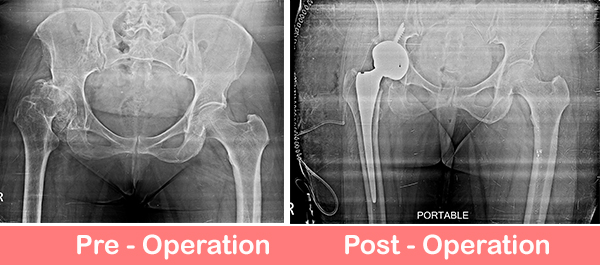

The hip joint is one of the largest weight – bearing joints of the body. In routine life our hip moves millions of times without even knowing, but once it gets damaged not only does the hip become stiff, but it also becomes painful and leads to difficulty in walking.

Hip replacement surgery is a well-established and successful operation in which the damaged hip joint is replaced with an artificial hip joint. It not only provides you freedom from pain, and stiffness, but also improves quality of life. This specialized operation is now very successful and has been accepted very well both by the medical fraternity and the society.
A. Fixation options
B. Bearing options
C. Head size options
D. Options for bipolar, tripolar and constrained cup liners
Dr. Shekhar Srivastav is HOD and one of the pioneers in hip replacement surgery. At Delhi Institute of Trauma & Orthopaedics, at Sant Parmanand Hospital, patients come from all over the world as it is considered one of the best hospitals for orthopaedics and specifically complex revision and primary hip replacement surgery. Dr. Shekhar Srivastav also trains young surgeons at the center to perform hip replacement surgery in Delhi and in India.
The three major types of hip replacement are:
There are two major surgical approaches for performing a total hip replacement:
Your surgeon will do a careful assessment prior to hip replacement surgery to ascertain whether the operation is appropriate for you. A physical examination, imaging tests, and a review of your medical history might all be part of this evaluation. Additionally, your surgeon will go through the advantages and disadvantages of the procedure with you and address any concerns you may have.
You might be advised to alter your way of life in the weeks before surgery in order to get ready. This can entail giving up smoking, eating healthier, or changing your medication. In order to increase your strength and flexibility prior to surgery, you could also be required to undergo physical therapy sessions.
You will get detailed instructions from your surgeon in the days and weeks preceding surgery. This can entail abstaining from taking specific drugs, fasting before the surgery, and making travel arrangements to and from the hospital.
Since hip replacement surgery is frequently carried out under general anesthesia, you will remain unconscious throughout. Usually, it takes several hours to perform the procedure.
Your hip will be cut during the treatment, and the injured hip joint components will be taken out. Then, a synthetic joint consisting of metal, plastic, or ceramic will be used to replace these damaged pieces. The new joint allows you to move more effortlessly and without pain because it is made to replicate the hip’s natural mobility.
You will be brought to a recovery room following hip replacement surgery so that you may be watched when you come back after the anesthetic. In the days following the treatment, you could feel some pain or discomfort, but your surgeon will give you painkillers to help you deal with these symptoms.
After surgery, you’ll probably need to stay in the hospital for a few days so your surgeon can watch over your healing and make sure there are no issues. You will start physical therapy at this time to increase your strength and mobility.
People with persistent hip discomfort can have a considerable improvement in quality of life after undergoing surgery performed by the Hip Replacement Surgeon for hip replacement. While there are certain dangers associated with the operation, for the majority of people, the advantages often outweigh the disadvantages.